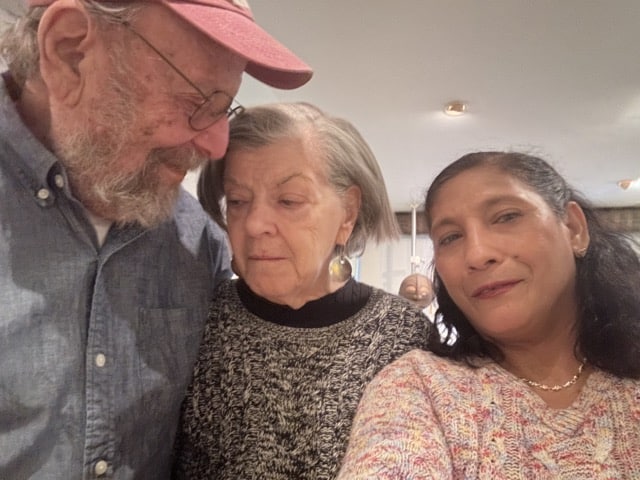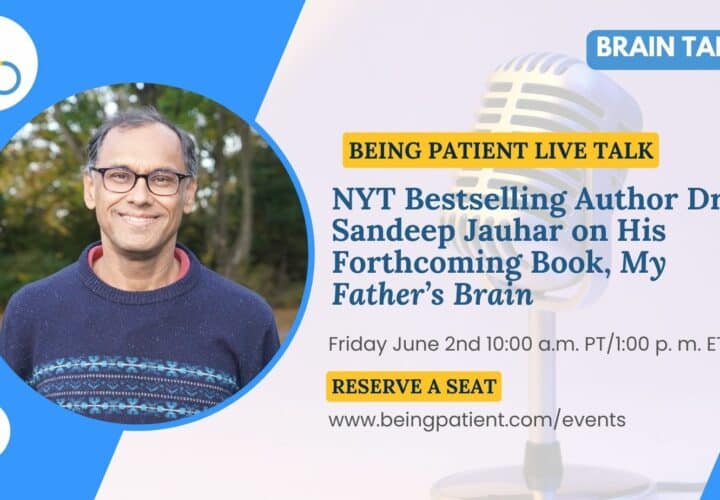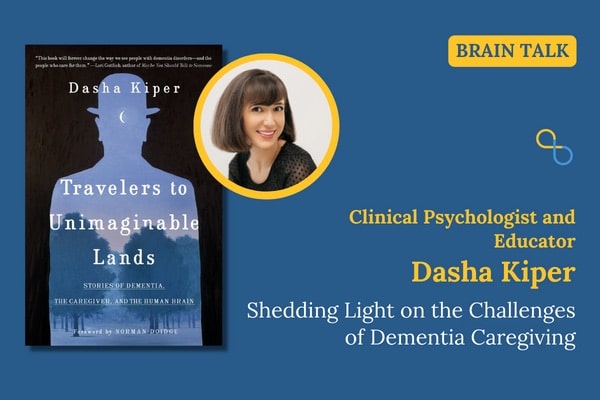Ira Asherman is, with his wife Sandy, a co-founder of the Alzheimer's and Dementia Resource Center of NYC. Here, he thinks back on six of the biggest questions that have emerged for him as he cares for Sandy, who is living with Alzheimer's, listed in the order he and Sandy faced them.
Our story began some thirteen years ago with a diagnosis of mild cognitive impairment. Despite our best efforts the diagnosis of Alzheimer’s followed several years later. Since then I have watched my wife slowly but assuredly slip away. With the help of multiple aides, a lot of love and effort and a good insurance policy (which can be a hard thing to come by these days), I have managed to keep her home with me.
Assuming you have already found appropriate medical care, here are six questions you might encounter as you care for your loved one, be that a spouse, partner, parent, or other Alzheimer’s patient you live with.
1. Should your loved one be told what the diagnosis is?
You may fear that it will be shattering if they hear they have Alzheimer’s. You may be right – they will probably find it very difficult to hear. For me, the decision was an easy one… that is, to tell my wife and the sooner the better. How do you say it so they are not crushed? Your goal here is not just “telling” but normalizing what is happening. Part of making that happen is not avoiding the terms Alzheimer’s and Dementia. Do not be afraid to say them. It is your new reality.
Related questions
Who should tell your loved one? Should you ask your doctor and children to be involved?
2. Should you tell family and friends?
This is a decision you will face early. It will not take long for your friends and relatives to figure out that something is wrong. My wife’s forgetting names or prior conversations or asking the same question over and over again were a clear give away. You cannot hide it. The sooner family and friends know the sooner they can help you. If they are good friends, they will want to help. Helping can mean a variety of things at different stages of the illness. Allow them in… they can make your life much easier. For us, our friends stepping up was a real statement of love and caring. It sustained me and allowed us, for many years to continue our social life. Being open with friends is part of the normalizing process.
Related questions
When exactly should you tell them? Are you violating a confidence by telling non-family members? What do you gain by discussing this with friends?
How Being Friends With Someone Who Has Dementia Can Be Good for You Both
Are the loved one’s finances in order?
Everything may have been fine prior to the Alzheimer’s diagnosis. However, Alzheimer’s changes everything and it can happen very quickly. You will reach a point where your loved one is unable to participate in making any decisions. Meet with your lawyer and financial advisor to make sure the will and other legal and financial documents reflect your new situation. Do it early while your loved one is still able to participate.
Related questions
Is your current attorney up to date on issues faced by seniors particularly where Alzheimer’s is involved or do you need an elder care attorney Is the accountant ready for this new situation?
4. What if the caregiver needs care?
The essential question is: What do you do if you are unable to serve as caregiver for a period of time and need care yourself? Do you have a back-up plan? Who will take care of your loved one in this situation?
When I was hospitalized we did not have a plan in place and our situation was further complicated by my wife’s Type One Diabetes. We were very lucky, as our aide along with friends and neighbors all came to our assistance. That was luck — but good luck is not a plan. I have now put our plan in writing and met with friends to ensure they are comfortable helping out.
Related questions
Have you spoken with the children or other family members so they can help out? Have you discussed the issue with the home health aide or their agency, if applicable? Are there any friends of yours you can call upon?
A Step-By-Step Guide to Assembling a Dementia Caregiving Team
5. Should you hire a home health aide?
This is not an issue that you will face early in the journey, but at some point, you will realize that you need help as the daily care of your loved one is more than you, your friends and relatives can manage. For us it was the beginning of a new chapter. In addition to cost, this is a decision that is fraught with problems.
Among them are convincing your loved one and at times other family members that an aide is needed. How will the two of you manage with another person sharing your living space. It will not be easy. Understand, that over time as the disease becomes more pronounced you may need someone five or seven days a week. Our primary aide has been with us for five plus years working five days per week from 9 a.m. to 6 p.m.

Related questions
Do you have the financial resources to pay for an aide? How many days a week do you need an aide? Do you care if it is a man or a woman? If your loved has long term care insurance, how much will that pay? What will it be like to have someone else in the house? Should you ask others for financial help? Should you hire from an agency or hire an individual person?
6. Should you move your loved one into a memory care center?
This is probably the most difficult, most heart breaking, and painful decision any of us will have to make. I continue to thank my lucky stars that I have not yet had to face this issue. I have looked at facilities just in case but have not yet made the fateful call. At some point we cannot escape the fact that we can no longer care for our loved one, or they now require 24/7 care. Once that happens you may find that a memory care facility is the best option.
Related questions
Can we afford the cost? How do you select a facility? How important is it for the memory care facility to be near your loved one’s home or family?
Dementia Decisions: ‘Should I Move My Loved One to a Nursing Home?’
Finding your own way to the answers
This journey of caring for someone with Alzheimer’s is a difficult and painful one. None of the issues outlined above are easy ones to address. I hope that knowing of them in advance will give other families an opportunity to prepare and not be overwhelmed when they present themselves.
As to how to find the answers to these difficult questions — everyone’s journey will be different, and the “right” or “wrong” answers to these big questions differ from family to family, too. But for our family, we’ve found our way to our own answers, in part, through community. I would offer one additional piece of advice, and that is to join a support group. Being with folks who have been on the journey can be truly helpful. I joined a support group years ago, and I cannot find the words to tell you helpful it has been.




This is truly an excellent piece. I am not living with someone who has Alzheimer’s, but many of my friends have traveled this path. The author raises such good questions for a painful bewildering time. And I am so glad he mentioned getting into a support group. Peer support would be so valuable. I think it must also be important to carve out some alone-time like a good walk.Or getting together one on one. I hope this article can be shared widely.
Thank you for being here, Pam! You’re exactly right. Taking time for a walk is linked to better physical, mental and cognitive health for everyone. 🙂 Please feel free to share this article with your friends who have traveled similar paths. Take care.
Those are my grandparents, and as a 20 year old I have grown up along with the development of Grandma Sandy’s Alzheimer’s. Sandy and Ira played (and continue to play) large roles in shaping who I am as I’ve grown up, and I think of every second I get to spend with Sandy, even if she won’t remember, as a chance give back all the love I know she gave me as a child, most of which I don’t remember. These hard questions are things that come up in every family that is experiencing this disease, and thankfully I have wise folks in my family like Ira who want to give back to the larger Alzheimer’s community by sharing these thoughts and experiences. Lots of Love – A lucky grandson 🙂
Hi Max, thank you for sharing. You’re lucky to have two incredible role models in your life. A lucky grandson indeed!
Great article Ira! You’ve seen how the journey unfolds and the challenges arise. We see that all the time as we’re in touch with folks 2 steps ahead of where you are, and 2,3, 10 steps behind you, every day.
And I especially appreciate your call out about accountants v. attorneys. I find more an more accountants realizing they need to help their clients w/some of this b/c the cost of the atty can be quite high.
Marc Rothman, MD
Lizzy Care
Thank you for being here, Marc. A great article by Ira, indeed!